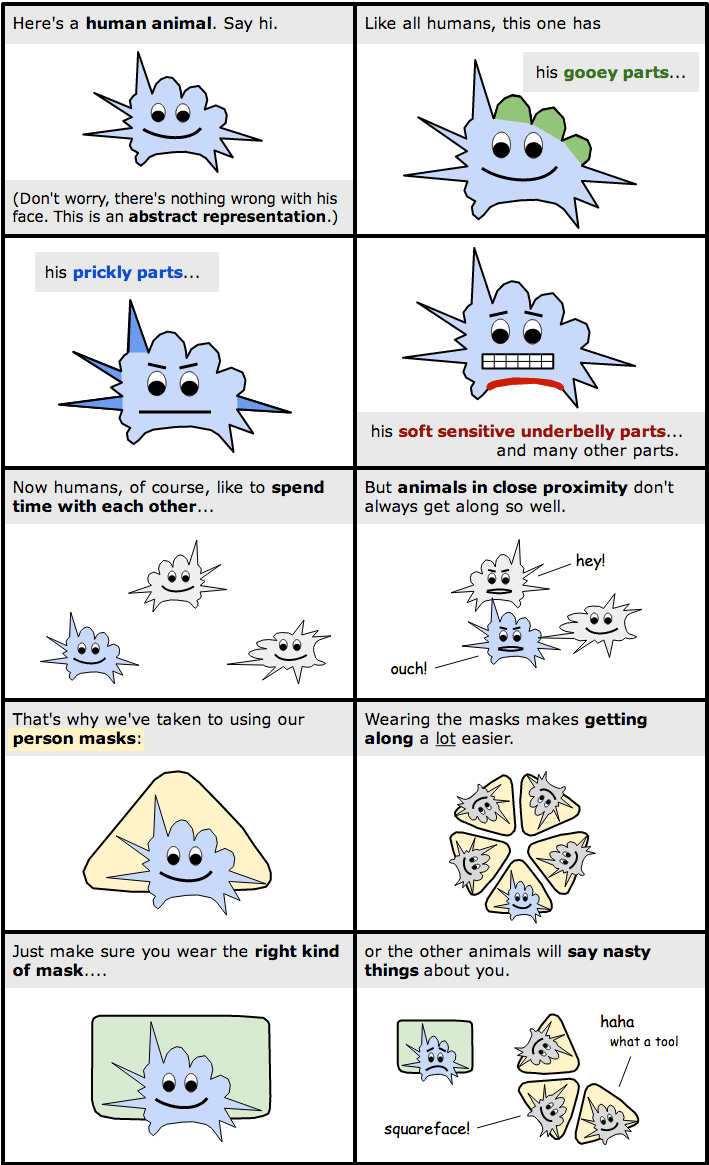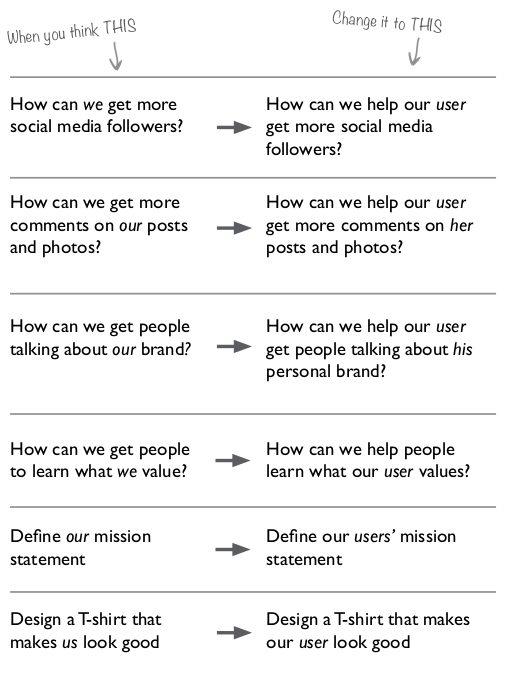Co-authored with AbstractFairy.
Maybe you’ve seen this comic by Kevin Simler.

You’ve accepted the premise, you read the essay, it matches your experiences, it seems like a useful frame.
But how do you use this frame for fun and profit?
[[Time, Money, and Masks]]
[[Mask Repair as Party Favor]]
[[Two Objections to Mask Repair]]
[[Attending to Masks]]
[[Mirroring]]
[[What You Get]]
READING TIME: 5 minutes
Time, Money, and Masks
When you look at companies that are worth billions, they have a few things in common. One of those things is what the firm does for the customer. In some way, they give the customer money or time. But there’s a third thing that’s often just as important to people: reputation. A lot of successful niche businesses deal primarily in helping get customers reputations that fit their goals.
These are not just marketing firms, either- consider the value an exceptional restaurant gives to the customer. By bringing guests to a restaurant with an ambience that encourages a particular clientele, that customer can boost their reputation as someone who hangs out where that clientele hangs out- so long as that clientele is aspirational for someone.
We can call these kinds of reputation laundering ‘mask production & maintenance’. If there’s something you want that’s far away, learning how to make and maintain masks for people will help you get what you want- no matter what culture you’re in.

From Kathy Sierra's 'Badass: Making Users Awesome'.
Mask Repair as Party Favor
It is a common reflex for people who have been hung up on things like Truth and Logic to point at others when they notice that the mask they’re wearing is falling off, tilted funny, or falling apart. Given that we live in a Masquerade, this is impolite. More importantly, unmasking people guarantees that they will, if it’s not too inconvenient, get in your way out of spite. Let’s say you were at a Halloween party and someone kept taking your mask off without first getting your nonverbal permission. Wouldn’t that be annoying? Now imagine that person didn’t wear a costume, and is going around trying to take everyone else’s costumes off.
So the ‘One Simple Hack’ to make it easier for you to get what you want later is to help fix people’s costumes. Tell someone when their fly is open. If there’s feathers falling off a mask, offer them some glue to stick them back on.
Two Objections to Mask Repair
Isn’t this enabling addiction or narcissism?
We live in a Society. These masks are part of what keeps things together. By what we choose to do, we reveal that we want things like high-pressure showers, streaming the anime Mushi-Shi to a laptop, or a Reuben with piles of corned beef and a brined sauerkraut. To get those, we need masks. A mask that fits well also fits with other masks. Crafting and repairing masks that fit better will get around some mask-fixations (such as narcissistic or borderline patterns).
What if someone becomes dependent on me to keep their masks up?
We live in a Society. We already depend on each other. As long as you put in the work to fit the ways people will depend on you, you can carry this weight. Further, as you help people get the faces that will help them get what they want, they will learn to do the same for others. It may not happen in a short time, but it will happen. You are a society, and any time you want society to do something, you have to do it first.
Attending to Masks
Paying attention is powerful. The difference between competent and expert is often in what they are sensing. Knowing where to pay attention is knowing how to track relevant change.
How does someone’s breathing change when their reputation is at stake? How do they start to move in the moment that they perceive it is in danger? What about when they feel it rising? What counts as infohazard to them- what spaces do they try to avoid?
If Alice feels that Bob is wrong about his perception of her, when, if at all, do you intervene? Well, whenever gets you closer to what you want, of course. Maybe you can help Alice find something to be proud of. Or something to be ashamed of, if that’s a closer fit to the mask she wants to wear. Here, participating in an Improv group informed by Keith Johnstone’s method will probably help, if you’ve never done it before.
Mirroring
If we want to get things over a long timescale, we will want people to learn how to fix and create their own masks. Acting as a mirror for people helps them do that. This also means you don’t have to concern yourself with praising or blaming people to help correct their masks. After all, you don’t typically reach out to someone and zip their fly when it’s open. Filling a room with mirrors, though, helps people see their own masks without making them feel called out. You might know what their mask looks like, but it’s very hard to know what someone wants their mask to look like- so it’s difficult to correct them directly, anyway. Maybe they want to appear fat, or weak, or financially irresponsible- it probably serves a greater purpose. But you won’t know that until you watch, listen, and let them show you. If they seem angry, let them know they seem angry. If they seem happy, let them know they seem happy.
What You Get
The better you make people look (while staying honest with reality), the more inclined they will be to help you out. A lot of this may never become conscious, and gets called ‘luck’ in hindsight. Strong weak ties are immensely valuable, and the primary reason why content is not the most important factor in spreading an idea (including the idea of your competence). So if you work for a multinational and want a transfer to another country, or a better job that will take you somewhere that will challenge your skills, make people look good! The good will come back to you eventually, in ways you will almost never predict!
- public document at doc.anagora.org/2023-08-15-manners-masquerade
- video call at meet.jit.si/2023-08-15-manners-masquerade
(none)
(none)
(none)
(none)